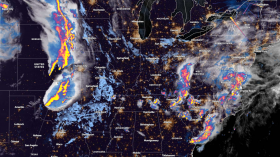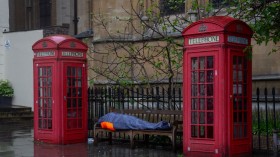Across North America, heat waves are becoming the norm. Cities in the United States have experienced record temperatures this year. In the U.S., all-time high temperatures were recorded in seven different states, including California, Arizona, New Mexico, Utah, Colorado, Wyoming, and Montana.
According to a new study from World Weather Attribution, scientists have found that the severe heat waves in the Pacific Northwest would be impossible without human-caused climate change. The team of 27 scientists concluded that climate change increased the probability of extreme heat occurring by at least 150 times.
What are Heat Waves?
A heat wave is a period of abnormally hot weather, usually lasting two or more days. The temperatures must be outside the historical averages in a given region to be considered a heat wave.
Heat waves form due to trapped air and a high-pressure system, forcing air downward. This type of force prevents air from rising, causing the hot air to get trapped. Without rising air, rain cannot form, causing hot air to continue to get hotter.
On average, over 600 people die every year in America due to preventable heat-wave illnesses. Extreme heat has caused more deaths than any other weather event, with a total of more than 11,000 deaths since 1979, according to the United States Environmental Protection Agency.
How to Prepare for a Heat Wave
When people are exposed to heat waves, they could potentially suffer from deadly illnesses, including heat exhaustion and heat stroke. Rising temperatures can contribute to other factors, including heart attacks, strokes, and other cardiovascular complications.
Adults over the age of 65 and young children are the most vulnerable to heat-related illnesses and death, although all individuals may suffer from extreme heat-related conditions. If you are over the age of 65, you may want to compare life insurance rates to be prepared for these kinds of increased risk.
With heat waves becoming more frequent, it is important to prepare yourself and your family to prevent heat-related illnesses from occurring.
Gather Emergency Supplies
Make sure you are prepared for every type of situation. Gather water, food, and medicine in advance in case stores are closed due to high heat levels or you are unable to leave your home.
In case of a power outage, make sure to include the following supplies in your emergency kit along with other basic necessities:
- One gallon of water per person per day
- A flashlight
- Batteries
- Non-perishable food items
- A first aid kit
- Medications
- Important documents including passports, driver's license, home insurance, etc.
- Cell phone
- Chargers
- Backup battery charger
- Cash
Stay Hydrated
Make sure you drink plenty of fluids, not only when you are outside but also when you are in your home. Replace sugary, caffeinated, and alcoholic drinks with water to avoid dehydration. Check on your household members and make sure they are drinking enough water throughout the day. If you have pets, make sure to provide them with plenty of water and place it in a shaded area.
Keep Your Home Cool
Do not rely only on a fan to keep your home cool. Fans provide temporary comfort, and when temperatures are about 95 degrees, they can be more harmful than helpful. Instead, prepare your home in other ways to help beat the heat.
- Cover your windows with drapes and/or shades
- Install window air conditioners and insulate them
- Use window reflectors to reflect the heat outside
- Control your attic temperature by using a powered attic ventilator to control heat back outside
- Seal air leaks around doors and windows
- Use your stove less
Keep Your Family Safe
If you or your family members have to leave home during a heat wave, whether that be for school or work, make sure you discuss safety precautions with them. If you do not have air conditioning, make sure to contact a friend or relative who has air conditioning.
Never leave children or animals alone in a vehicle if you decide to travel to a cooler destination. When the temperature outside is 80 degrees or above, in one hour, the interior temperature of a vehicle can reach 120 degrees. Act right away if you or your family members experience signs of heat-related illnesses.
Treating Heat Exhaustion
Heat exhaustion is a serious heat-related illness that requires medical attention. If you or a loved one experiences heat exhaustion, it is important to take the necessary steps to prevent personal injury.
First Signs of Heat Exhaustion:
- Heavy Sweating
- Muscle Cramps
- Clammy and pale skin
- Headache
- Dizziness
- Fainting
- Weak, fast pulse
- Vomiting
- Nausea
How to Treat Heat Exhaustion:
If you witness someone with signs of heat exhaustion, you should do the following:
- Make sure the person is in a cool area
- Put damp, cool cloths on them
- Have the person sip water
- Make sure the person is comfortable and loosen their clothing if necessary
If symptoms last longer than an hour and get worse, it is important to get medical attention right away.
Treating Heat Stroke
Heat stroke is the most serious heat-related illness that is considered a medical emergency.
First Signs of Heat Stroke:
- High Body Temperature of 104 degrees F or higher
- Headache
- Dizziness
- Nausea
- Vomiting
- Fainting
- Fast pulse
- Hot, dry, and damp skin
- Altered mental state or behavior
How to Treat Heat Stroke:
- Do not give the person anything to drink
- Move the person to a cooler area
- Put damp, cool cloths on them
It is important to call emergency services right away if you are experiencing any of these symptoms. Very high body temperatures can damage the brain and other vital organs, so it is important to get medical attention right away if you or someone you know is experiencing any of these symptoms.
During a heatwave, make sure to take the necessary precautions to keep you and your household safe.
When a heat wave hits, make sure to drink lots of water, wear lightweight clothing, stay inside as much as possible, and check on loved ones to make sure they are safe. Heatwaves are serious and can be life-threatening, with global temperatures continuing to rise. Contact your city or local health departments for other helpful information on how to stay safe during a heatwave.
© 2024 NatureWorldNews.com All rights reserved. Do not reproduce without permission.
* This is a contributed article and this content does not necessarily represent the views of natureworldnews.com






